
Harnessing the Future: Innovative Applications of AI in Disaster Management
Explore how artificial intelligence is transforming disaster management through innovative applications and emerging technologies. This blog delves into the AI tools and systems that aid in disaster prediction, response, and recovery, providing insights into the future of crisis management and the vital role AI plays in saving lives and minimizing damage.
Introduction
In recent years, the increasing frequency and severity of natural disasters have prompted a significant global challenge. As climate change exacerbates these events, effective disaster management becomes crucial. Enter artificial intelligence (AI) - a powerful ally in predicting, preparing for, and mitigating the impacts of disasters. In this blog, we'll explore how AI is reshaping disaster management and enhancing our ability to tackle these crises head-on.
AI in Disaster Prediction
Weather Prediction Models
AI-driven weather forecasting models use machine learning algorithms to analyze vast amounts of weather data, improving the accuracy of predictions. These advanced models can predict severe weather events such as hurricanes, floods, and tornadoes more accurately and rapidly than traditional methods.
Early Warning Systems
AI enhances early warning systems by processing sensor data from satellites, drones, and ground sensors in real time. This timely analysis allows for quicker alerts and more accurate warnings, enabling communities to prepare and evacuate in advance, thereby saving lives and reducing the economic impact of disasters.
AI in Disaster Response
Automated Drones and Robots
Drones powered by AI are revolutionizing disaster response efforts by providing real-time aerial imagery and data collection, which is instrumental in assessing damage and locating survivors. Robots, on the other hand, can navigate through debris, access hazardous areas, and assist in rescue operations.
Resource Allocation
Optimizing the allocation of resources during a disaster is critical for effective response. AI algorithms assist emergency services in deploying personnel, equipment, and supplies to areas of greatest need, improving the overall efficiency of disaster response operations.
AI in Disaster Recovery
Infrastructure Assessment
Post-disaster recovery efforts benefit greatly from AI-driven tools that can quickly assess the extent of infrastructure damage. Machine learning models analyze satellite images and other data to determine which areas require immediate attention, expediting the rebuilding process.
Psychological Support
AI chatbots can provide psychological support and information to affected individuals and communities, offering a channel for emotional aid and critical information distribution after a disaster.
Challenges and Ethical Considerations
While AI presents immense potential in disaster management, it also poses challenges and ethical considerations. Data privacy, algorithmic bias, and the need for human oversight are critical factors that must be addressed to ensure responsible AI deployment in disaster scenarios.
Future Prospects
The future of disaster management will likely see increased integration of AI technologies. Innovations like AI-powered blockchain for transparent relief distribution, and advanced machine learning models for climate adaptation strategies, hint at a transformative era in crisis management. Continuous research and collaboration between AI specialists, policymakers, and disaster management professionals are essential to fully harness the benefits AI offers in this domain.
Conclusion
Artificial Intelligence stands as a pivotal force in revolutionizing disaster management by enhancing prediction, response, and recovery processes. As we continue to face significant environmental challenges, the integration of AI in disaster management strategies becomes not just beneficial but necessary. By leveraging AI's capabilities, we are better equipped to protect lives, reduce economic losses, and build resilient communities in the face of adversity.